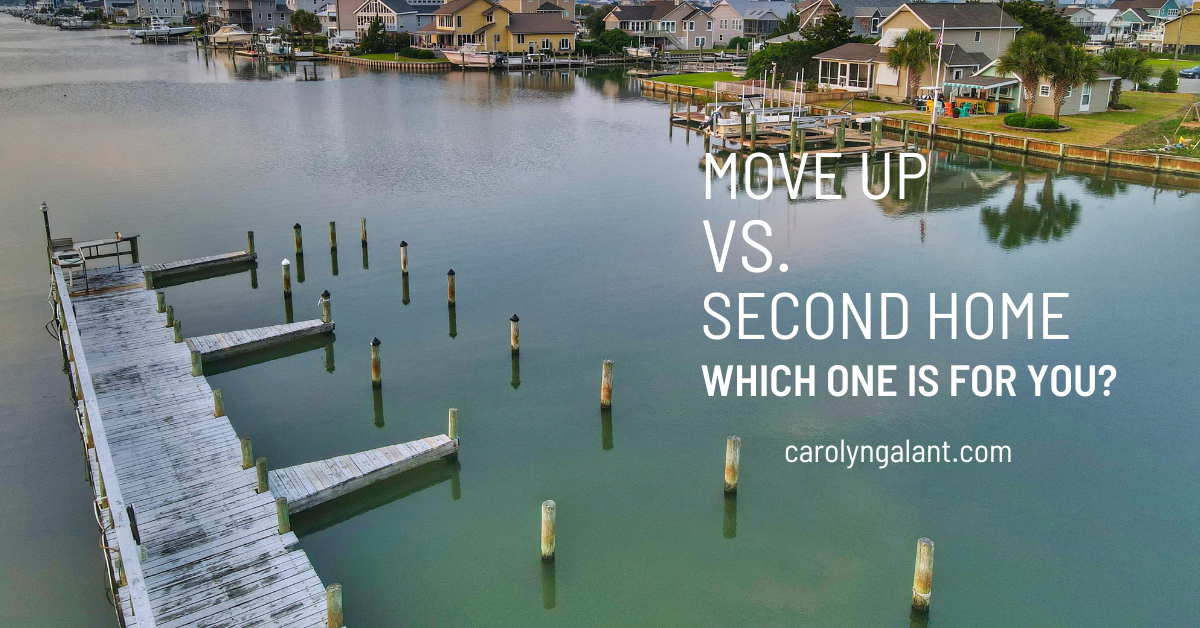Move-Up vs. Second Home: Which One Is Right For You?
The pandemic has changed the way many of us live, work, and attend school—and those changes have impacted our priorities when it comes to choosing a home.
According to a recent survey by The Harris Poll, 75% of respondents who have begun working remotely would like to continue doing so—and 66% would consider moving if they no longer had to commute as often. Some of the top reasons were to gain a dedicated office space (31%), a larger home (30%), and more rooms overall (29%).1
And now that virtual school has become a reality for many families, that need for additional space has only intensified. A growing number of buyers are choosing homes further from town as they seek out more room and less congestion. In fact, a recent survey found that nearly 40% of urban dwellers had considered leaving the city because of the COVID-19 outbreak.2
But not everyone is permanently sold on suburban or rural life. Instead, some are choosing to purchase a second home as a co-primary residence or frequent getaway. Without the requirements of a five-day commute, many homeowners feel less tethered to their primary residence and are eager for a change of scenery after spending so much time at home.
If you’re feeling cramped in your current space, you’ve probably considered a move. But what type of home would suit you best: a move-up home or a second home? Let’s explore each option to help you determine which one is right for you.
WHY CHOOSE A MOVE-UP HOME?
A move-up home is typically a larger or nicer home. It’s a great choice for families or individuals who simply need more space, a better location, or want features their current home doesn’t offer—like an inground pool, a different floor plan, or a dedicated home office.
Most move-up buyers choose to sell their current home and use the proceeds as a downpayment on their next one. If you’re struggling with a lack of functional or outdoor space in your current home, a move-up home can greatly improve your everyday life. And with mortgage rates at their lowest level in history, you may be surprised how much home you can afford to buy without increasing your monthly payment.3,4
|
To learn more about mortgage rates, contact us for a free copy of our recent report! |
One major benefit of choosing a move-up home is that you can typically afford a nicer place if you spend your entire budget on one property. However, if you’re longing for that vacation vibe, a second home may be a better choice for you.
WHY CHOOSE A SECOND HOME?
Once reserved for the ultra-wealthy, second homes have become more mainstream. Home sales are surging in many resort and bedroom communities as city dwellers search for a place to escape the crowds and quarantine in comfort.5 And with air travel on hold for many families, some are channeling their vacation budgets into vacation homes that can be utilized throughout the year.
A second home can also be a good option if you’re preparing for retirement. By purchasing your retirement home now, you can lock in a low interest rate, start paying down the mortgage, and begin enjoying the perks of retirement living while you’re still fit and active. Plus, it’s easier to qualify for a mortgage while you’re employed, although you may be charged a slightly higher interest rate than on a primary home loan.6
One advantage of choosing a second home is that you can offset a portion of the costs—and in some cases turn a profit—by renting it out on a platform like Airbnb or Vrbo. However, be sure to consult with a real estate professional or rental management company to get a realistic sense of the property’s true income potential.
WHICH ONE IS RIGHT FOR ME?
You may read this and think: I’d really like both a move-up home AND a second home! But if you’re dealing with a limited budget (aren’t we all?), you’ll probably need to make a choice. These three tactics can help you decide which option is right for you.
- Determine Your Time and Financial Budget
You may meet the bank’s qualifications to purchase a home, but do you have the time, energy, and financial resources to maintain it? This is an important question to ask yourself, no matter what type of home you choose.
Most buyers realize that a second home will mean double mortgages, utilities, taxes, and insurance. But consider all the extra time and expense that goes into maintaining two properties. Two lawns to mow. Two houses to clean. Two sets of systems and appliances that can malfunction. Second homes aren’t always a vacation. Make sure you’re prepared for the labor and carrying costs that go into maintaining another residence.
Of course, some move-up homes require more work than a second home. For example, if your move-up option is a major fixer-upper, you’ll probably invest more energy and capital than you would on a small vacation condo by the beach. Have an honest discussion about how much time and money you want to spend on your new property. Would a move-up home or a second home be a better fit given your parameters?
- Rank Your Priorities
If you’re still undecided, make a wish list of the characteristics you’d like in your new home. Then rank each item from most to least important. This exercise can help you determine your “must-have” features—and which ones you may need to sacrifice or delay. Here’s a sample to help you get started:
|
# |
FEATURE |
|
Dedicated home office |
|
|
Extra bedroom |
|
|
Pool |
|
|
Walk to the beach |
|
|
Big backyard |
|
|
Close to friends and family |
|
|
Short commute to the office |
|
|
Investment potential |
- Explore Your Options
Once you’ve determined your parameters and priorities, it’s time to begin your home search.
If you’re still not sure whether a move-up home or a second home is right for you, we can help.
Contact me to schedule a free consultation. We’ll discuss your options and help you assess the pros and cons of each, given your unique circumstances.
I can also send you property listings for both move-up homes and second homes within your budget so you can better envision each scenario.
LET’S GET MOVING
Whether you’re ready to make a move or need help weighing your options, we’d love to help. We can determine your current home’s value and show you local properties that fit within your budget. Or, if your heart is set on a second home in another market, we can refer you to an agent in your dream locale. Contact us today to schedule a free, no-obligation consultation!
Sources:
- Zillow –
https://www.zillow.com/research/coronavirus-remote-work-suburbs-27046/ - The Harris Poll –
https://theharrispoll.com/should-you-flee-your-city-almost-40-have-considered-it-during-the-pandemic/ - MarketWatch –
https://www.marketwatch.com/story/mortgage-rates-keeping-falling-so-will-they-finally-drop-to-0-2020-08-13 - Toronto Star –
https://www.thestar.com/business/2020/08/07/you-can-get-a-fixed-rate-as-low-as-184-per-cent-which-is-unbelievable-low-mortgage-rates-driving-up-home-prices.html - Kiplinger –
https://www.kiplinger.com/real-estate/buying-a-home/601091/timely-reasons-to-buy-a-vacation-home - The Press-Enterprise –
https://www.pe.com/2018/11/17/5-tips-on-when-should-you-buy-a-retirement-house-hint-before-you-quit-work/

 Facebook
Facebook
 Twitter
Twitter
 Pinterest
Pinterest
 Copy Link
Copy Link




